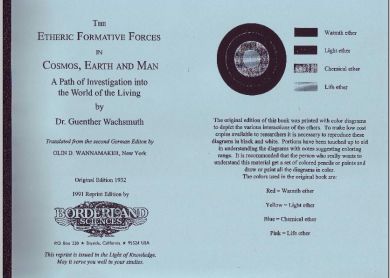Doctor CamNC4Me wrote:Well, when you have such devastating insights such as, "... a photon which is a mushy ball of magnetic and electrostatic radiation." I'm left wondering why we even bother funding research institutions at all.
- Doc
If you read him closely he's basically calling all scientists, including DrW, liars and frauds. The insecurity, it hurts.
 https://skullsinthestars.com/2008/01/04 ... crackpots/
https://skullsinthestars.com/2008/01/04 ... crackpots/3. An obsession with ad hominem attacks, or a focus on criticizing individuals rather than theories. Crackpots will often focus their attacks and attention on the ‘founding fathers’ of a scientific theory. These attacks may be honorably limited to the research of the individual, but just as often as not become personal attacks on a researcher’s character.
Darwin is the most common target for ad hominem attacks. Creationists love to tell the story of how he recanted on his deathbed (not true), and are eager to point out that Darwin knew very little mathematics (not that they know any more than he did, in most cases). Einstein is usually not slandered, but there is a special emphasis on trying to find flaws in his original papers.
Such arguments are completely irrelevant, in any case. Science, strictly speaking, does not care about the character of an individual, only how well his theories hold up against reality. Furthermore, as mentioned above, successful theories grow beyond the vision of their ‘parent’, changing to incorporate new experimental evidence and growing stronger with each new independent confirmation. Metaphorically speaking, figures such as Darwin and Einstein only gave birth to their theories: generations of scientists since then have adopted those theories, helped them grow and become stronger.
4. Constant references to a conspiracy against the author’s results. When science dismisses, ignores, or mocks the work of the crackpot, it is never the crackpot’s fault: either the audience of scientists are too ‘vain and ignorant’ to comprehend the genius at work, or the scientists are actively conspiring to hide THE TRUTH from the general public, for reasons of ideology or self-interest.
Creationists love to make this accusation. Their ‘creation science’ is only ignored because scientists are afraid to challenge the establishment or because scientists are attempting to fulfill some sort of atheistic conspiracy.
It is true that science is a human endeavor, and is potentially subject to all the human foibles such as greed, lust for power, pride, and jealousy. (Check out Great Feuds in Science for a description of ten of the liveliest fights.) The community as a whole, however, is quite self-regulating in a “free-market” manner: for every scientist who might want to suppress a new discovery for selfish reasons, there are numerous others who would love to take credit for making that discovery.
Science as a whole is a somewhat conservative discipline: radical changes in thought are resisted until undeniable evidence is presented in its favor. The fact that crackpots are ignored has nothing to do with conspiracy and everything to do with their utter lack of evidence.
5. An extreme view that an established scientific theory is “completely wrong”. I used to get spam email regularly (another sign of a crackpot) from a person in China with the header, “Uncertainty principle is untenable!” I never bothered to read the message, but I doubt that I missed any revelatory new physics.
Crackpots are typically not only convinced that a theory is flawed, but that the theory is completely wrong. Our relativity denialists take issue with Einstein’s founding postulates, and with that belief, feel free to ignore all supporting evidence that comes along.
6. Criticisms of existing theories which rely on “common sense”. This particular branch of’ ‘crackpottery’ reminds me of a personal anecdote. Years ago I was wandering through the lamp department of a Service Merchandise store, when I noticed bright red signs prominently displayed: “CAUTION! Light bulbs are hot! Do not touch!”
Common sense is evidently a terribly inaccurate method of understanding the world! I’ve mentioned in previous posts numerous modern “common sense” ideas which were anything but when first proposed, among them: Newton’s laws, heliocentrism, the germ theory of disease, the brain as the center of intelligence, the theory of atoms.
For relativity denialists, the idea that space and time are intermingled violates common sense. They have no strong quantitative criticism of the theory (which they probably don’t understand anyway), only a mushy notion that it “feels funny”. Relativity felt funny to a lot of people, who raised objections to the theory in the form of apparent paradoxes — all of which were resolved successfully. The lesson physicists learned from this is that “common sense” is an artifact of our limited perceptions and place in the universe. In fact, modern science was really born when people realized that the universe might work differently in circumstances different from those experienced in daily life.
7. A complete absence of quantitative analysis. In a 165-page “primer” on geocentricity (discussed in another post), the long-disavowed notion that the Earth is the center of the universe, a crank author uses no calculations to back up his extravagant alternative theory of celestial motion. He claims the theory works just fine, but does it? Without calculations which can be checked for errors and compared to experiment, there’s no immediate way to tell. The relativity denialists mentioned earlier also present no quantitative results to back up their ideas, only appeals to “common sense”. The Templeton Foundation, a group dedicated to promoting the links of science and religion, once asked for proponents of intelligent design (dressed-up creationism) to submit research proposals. “They never came in,” said the Foundation’s senior vice president.
